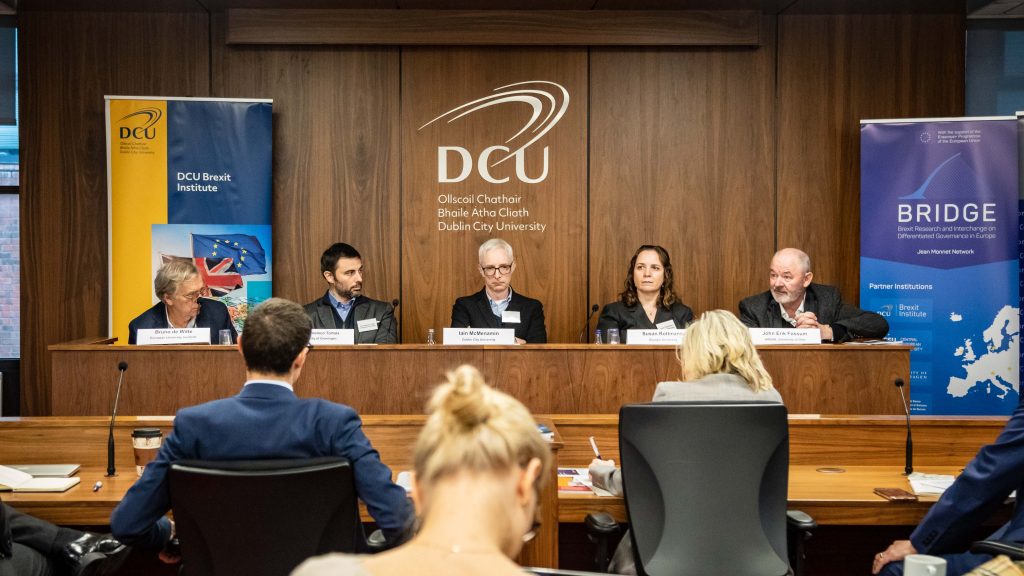On 30th – 31st October 2019 the Brexit Institute launched the BRIDGE Network (Brexit Research and Interchange on Differentiated Governance in Europe), in collaboration with the its partner institutions- the University of Bolzano/Bozen, the University of Copenhagen and the Central European University (CEU).
The BRIDGE conference took place in Dublin and it was opened by Prof. Federico Fabbrini (Director of the Brexit Institute) who welcomed all the partners, lecturers and participants, and explained the main features of BRIDGE. The Project, which lasts three years, brings together lawyers, political scientists and economists, creating a new and vibrant network of scholars. Even if Brexit is the starting point, it has the ambition to go beyond by exploring also other challenges. BRIDGE is just the first step towards the creation of a broader European forum where new perspectives for the EU are discussed. It will have a lot of different outputs, such as events hosted by the partners, working papers and reports. The ultimate aim is to design a book about the future of Europe.
The keynote speech given by Ed Sibley
The opening keynote speech was given by Ed Sibley (Deputy Governor of the Central Bank of Ireland), who spoke about the economic and financial risks of Brexit, highlighting the Central Bank approach. The Central Bank started working on the risk analysis even before the referendum, as the first report on the issue was produced in 2015. He also showed some data, recently published in the 4 Quarterly Bulletin 2019, regarding both deal and no-deal scenarios. In the event of a “hard Brexit”, the main risk is the shock to the exchange rate, trade, consumption and investment.
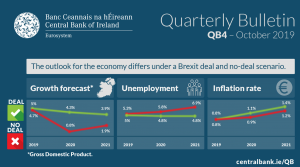
He showed a positive attitude towards the future of the financial sector. Before the referendum the Central Bank has worked with firms to drive preparations and he thinks that the Irish financial system is resilient enough to withstand a “hard Brexit”. The majority of Irish authorized firms (banks, insurers, investment firms) have taken action to prepare and a lot of firms expanded their operation in Ireland to continue to serve EU customers.
Mr. Sibley believes that we are heading to “the end of the beginning”, since the withdrawal agreement will be just the first step, followed by the transitional period and, more importantly, the long term relationship between UK and EU. He also underlined that we should focus on this last step; even if the ultimate outcome is still uncertain, a lot of work has been done and there is still a lot of work to do.
The Deputy Governor concluded his speech with some positives outcomes. Thanks to the challenges arising from Brexit, the work of many (like the Central Bank Department of Finance, single firms etc..) has been probably harder; but, at the same time, it has delivered a high level of preparedness. Moreover, Ireland has played an important role in reinforcing the drive for a European regulatory and supervisory convergence. Finally, he stressed the resilience of the Irish economic system, by reminding that many are prepared for a “no-deal” scenario. The Central Bank is serving the public good by making sure that financial services firms can continue to save Irish economy, consumers and investors.
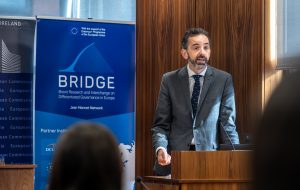
Seminar 1: The future of Europe, bridging the challenges
This first session was chaired by Gerry Kiely, Head of European Commission Representative in Ireland, and it was held by lecturers from all the partners of the BRIDGE Project.
The discussion was opened by Prof. Federico Fabbrini, who presented his paper about the EU crisis and the future perspectives of integration. The European Union faced a lot of crisis, such as Euro-crisis, Migration and Rule of Law crisis, and now Brexit is one of them. He stressed the need to reshape the future of EU, by thinking about new forms of integration and differentiation could be a response to the EU crisis. Brexit itself shows a different way to be part of the EU, Britain is opening up a new experiment: the semi-membership model. Finally, Prof. Fabbrini said that the difficulties that Europe is facing have much to do with the telos, the purpose, of EU itself. Indeed, he concluded underlining the need of institutional reforms to reconcile alternative visions of integration.
The second panelist was Prof. Stefania Baroncelli, from the University of Bolzano, one of the BRIDGE partners, who showed the contribution that the University will give to the network, their ongoing research projects and their publications, particularly the ones focused on Brexit and the Euro-crisis. The following speaker was Prof. Helle Krunke, from the University of Copenhagen. She presented several research projects, concerning many of the current EU challenges: from constitutional identity and democracy, to populism, from sustainability to digitalization, from Rule of Law to direct democracy experiences. Moreover, Prof. Krunke presented the Transnational Solidarity Project and she concluded by saying that the University of Copenhagen can certainly contribute to the network with a Nordic perspective.
The last speaker of the panel was Prof. Renata Uitz, from the Central European Union, who spoke about differentiated governance and the Rule of Law. She believes that the revival of this model is probably due to the lack of response to the rise of populism and illiberalism. Regarding Rule of Law she stressed the presence of a gap between legal and political processes in the EU. The Commission’s infringement action is efficient but it is targeted, it is not systemic. The illiberal and populist actors take advantage of the lack of clarity on standards. Finally, she concluded by saying that Rule of Law should not be included in the process of differentiation.
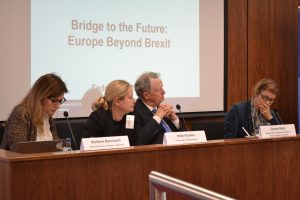
Seminar 2: Research issues on Europe’s challenges
The second seminar was chaired by Prof. Maura Conway, from the Dublin City University. The first panelist was Prof. Ian Cooper, from the DCU Brexit Institute. He spoke about the connections between EU crisis (euro-crisis, migration, populism and the Rule of Law and Brexit) and how they can affect each other. He believes that they posed a fundamental challenge to the political, economic and legal order of the EU, and they revealed the eternal weaknesses within the Union. The Euro-crisis and Brexit, for instance, threatened fundamental values such as freedom of movement and Rule of Law. We can affirm that Brexit was influenced by the other crisis but, at the same time, it has an impact on the other crisis, and this becomes quite obvious when it comes to citizens’ rights. The main objective of his presentation was to give a framework for these crisis and future perspectives.
The second panelist was Prof. Orsolya Farkas, from University of Bolzano. She raised a lot of interesting questions about migration and EU citizenship, focusing on the effect of Brexit on citizens’ rights. She underlined some problem on both sides: on the one hand, the British labor market will certainly be in need if a lot of EU citizens will decide to leave the UK because of Brexit; on the other hand, we cannot be sure that they will have incentives to go back to their home countries. Prof. Farkas concluded giving some ideas for future perspectives: differentiated integration of minorities (like the Italian linguistic minorities that have a certain level of autonomy), increment of the legal channels of immigration (since all Member States need labor force).
The last speaker was Prof. Sune Klinge, from the University of Copenhagen. His PhD project is focused on Rule of Law crisis in Europe. He started explaining the different perceptions of Rule of Law in the EU and then he focused on the response of the ECJ to the Polish crisis. Prof. Kinge is also part of the Demos project about populism and democracy. Regarding this, his ultimate scope is to find out what populism means on a legal ground, analysing political strategy and communication. Finally, he proposed to unite Europe looking at the crisis of the future. The climate crisis, for example, could be a good starting point to talk about the other EU crisis.
This session was concluded by a brief presentation of the European Journal of Legal Studies (EJLS). The Journal is run by young researchers and it is linked to the Department of Law of the European University Institute (EUI). The EJLS has open access and it hosts papers in the field of European Law and Comparative Law. Moreover, they recently cooperated with Professor Fabbrini and managed to publish a special issue on the Brexit negotiations and the May Government.
Seminar 3: PhD research seminar
The second day of the event started with a panel of PhD students, chaired by Prof. Ian Cooper (DCU Brexit Institute).
First PhD student presenting her research about the protection of linguistic rights in EU was Dr. Anna Krisztán, from EUI. Her main focus is the promotion of linguistic diversity within the Union, which has generally two forms: linguistic policy and language laws. Finally, she focused on the possible proposals to protect linguistic minorities, that are not represented since they are not among the 24 official languages of the EU.
The second PhD student was Dr. Simon Drugda, from the University of Copenhagen, who presented his research on judicial reputation, focusing on judicial diversity, social media and the relationship with the public. He analyses, in particular, the use of social media by the UK Supreme Court in the Miller cases.
Then, Dr. Sose Mayilyan from DCU, presented her interdisciplinary research about freedom of movement and social benefits. Her research question concerns the change of approach of the CJEU about the freedom of movement and the access to social benefits. The Court of Justice is probably going back since the Dano case, and this approach can be due to four main factors of different nature: institutional, social, economic, political. She focused on the social one, showing some data about migration and employment connected to the freedom of movement and EU enlargement.
Finally, the last PhD student was Dr. Magdalena Smieszek, from CEU, who spoke about European identity and its crisis. She started by saying that a crisis is a psychological phenomenon. In her research, she has been adopting an interdisciplinary method, using the typical tools of psychological analysis and the social psychology of inclusion and exclusion.
Seminar 4: Different perspective and differentiated integration
The last session, chaired by Prof. Iain McMenamin (DCU – Head of Law and Government School), was about different perspectives on Differentiated Integration (DI).
Prof. John Erik Fossum (ARENA, University of Oslo) explained the challenges arising from differentiation. He underlined the distinction between differentiation and differentiated integration, since the former one refers to social changes, while the latter is a political process. All political systems are differentiated, and differentiation is not a problem itself, on the contrary, it is an essential element to govern complex societies and to sustain democracy.
The second panelist was Prof. Pier Domenico Tortola (University of Groningen), who explained the EU IDEA Project and its goals. The main objective is to formulate a new idea of differentiated integration and to formulate policy prescription and scenarios on DI, that leverage on theoretical as well as practical knowledge. The Project aims to set apart a conceptual and methodological innovation of the concept of Differentiated Integration, a policy-oriented approach and finally a focus on Brexit as a key ongoing development in differentiated integration.
Prof. Susan Rottman, from Özyegin University, presented her project “Multilevel Governance of Mass Migration in Europe and Beyond”, which aims to understand governance of recent mass migration at macro, meso and micro levels, through a cross-country comparative research. The method includes the evaluation of border management and the Common European Asylum System (CEAS).
Finally, Prof. Bruno De Witte, from EUI, presented his project on differentiated European integration. He started by observing that some countries of the EU simply do not participate in important decisions and that the external relations of the Union are differentiated in nature. The legal dimension of the Project is close to the demands of the EU Commission. He explained that there are some legal instruments, a first option may be the enhance cooperation (e.g. a group of countries goes ahead without others), and a second option is for a group of countries to go outside and establishing a different Treaty with different forms of cooperation. Both of them have their pros and cons. In fact, the first system is open to everyone, it does not create a closer group of countries because they cannot refuse the joining of others, while the possible disadvantages are the potential abandonment of the constitutional framework of the EU (semi-democratic, rule of law). The conclusion is that differentiated integration is a good idea, but how it can be put forwards can be unclear.
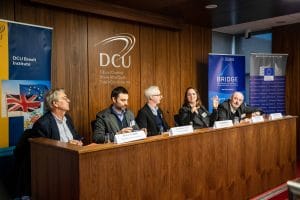
Conclusions: bridging research and policy on the future of Europe
The last session was chaired by Prof. Federico Fabbrini (Director of the DCU Brexit Institute). The first speaker was Prof. Dr. Ernst Hirsch Ballin (Professor at Tilburg University and the University of Amsterdam and Member of the Scientific Council of Government Policy, also former Justice Minister of the Netherlands) who presented the book “European variation as a key to cooperation”. He also provided an insightful narrative of the history of differentiation in Europe, giving first hand examples from his political career on how the different stage of the process of EU integration have created the actual situation. Finally, Julie Smith, Baroness Smith of Newnham (Member of the UK House of Lords) spoke about Brexit and differentiated integration, underlining the difficulties the UK had since the very first beginning of its EU membership. She believes that the UK created a precedent for the countries which joined in 2004, to have the possibility to ask for more opt-outs. As an academic borrowed to politics, she also stressed on the importance of communication between educators and policy makers as the basis of a fruitful dialogue that could lead to policy improvements. It is important, she concluded, for complex issues as Brexit, that academics are able to convey convoluted concepts in simple terms. The discussion was followed by interesting and dynamic debate.
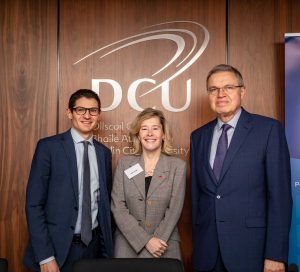
Jasmine Faudone is Research Intern at the Brexit Institute. She has a Master in Comparative Constitutional Law from the University of Bologna.


